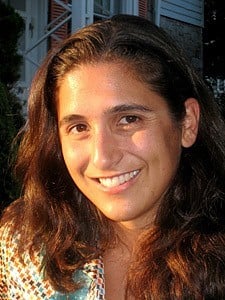Parshat Vayeshev recounts the cover-up of Joseph’s sale into slavery. The brothers present their father with Joseph’s coat and Jacob dutifully reads their script: “It is the coat of my son. An evil beast has devoured him; Joseph is without a doubt torn in pieces.”[1]
There is, however, another more discerning witness to the brothers’ deception: “But Isaac,” the midrash tells us, “knew that [Joseph] was alive.”[2] The blind old man had long ago played the mark in a similar melodrama between Jacob and Esau: He could surely sniff out the acrid return of filial betrayal crossed with brotherly hate.
Yet Isaac remained silent as his son tumbled into a grief as dark as the grave. Jacob “refused to be comforted, saying, ‘No, I will go down mourning to my son in Sheol. And his father wept for him.” This last “father” and this latter “him,” Rashi informs, refer not to Jacob weeping for Joseph, but to Isaac weeping for Jacob. “Isaac cried because of the grief of Jacob, but he did not mourn, for he knew that [Joseph] was alive.”[3]
God and Joseph also guarded the brothers’ secret from the bereaved Jacob. The midrash relates that God did not reveal the deception “because the brothers had placed a ban or a curse on anyone who would reveal the truth and they had included God in their pact of silence.” And since the ban extended to him as well, neither did Joseph send word to his abject father.[4]
But Isaac’s tongue was not bound by the ban. The old man fashioned his own muzzle, guided, as Rashi explains, by a peculiar logic: “How shall I reveal [the deception] when the Holy One Blessed Be He does not desire to reveal [it] to him?”[5]
Isaac’s justification is as bewildering as it is pathetic. Was this not the same man who had bent God’s will to his own as he pleaded for a child? Was this not Isaac to whom God did not simply respond, but “let Himself be urged, persuaded and won over”[6]? How could this man, Divinely validated for his efforts to intervene in God’s plans, remain mute?
Because, I would proffer, Isaac was first and foremost the son nearly slain by his own father. One can only imagine the punishing silence that engulfed the boy after weathering this horror; the inarticulable terror that surely pursued him into adulthood, chasing him into the fields to seek refuge in twilight meditation.
The old man was tattooed with the shame and secrecy that are violence’s imprints, and the brothers, it seems, knew how to read their grandfather’s ancient body. They understood that Isaac would further extend his silence, unfurling it to muffle not only that which was done to him, but also the violence of others to others, the violence that seemed to lurk within his family. Deftly, correctly, the brothers wagered that they need not gag Isaac with their ban: He could instead be counted on to keep his terrible, turbulent peace; to break his silence only to mutter: It is the will of God.[7]
The silence of those who weather man’s violence is a depressingly reliable proposition. But sometimes the brothers’ cynical wager is lost and silence is cracked open. This has been the case in Guinea, where in September’s broad daylight, soldiers brutally murdered and raped opposition demonstrators in a stadium in the country’s capital. The exact number of those raped is not known because of the shame and fear that have silenced so many of the victims—and even the doctors who treat them. Some, however, have spoken.[8]
In this country of conservative mores, reporter Ofeibea Quist-Arcton did not expect the women to speak of their experiences. But to her surprise, those whom she met at a safe house wanted—indeed, needed—to tell their stories. Few had told their families of their ordeals. One shook violently as she spoke. Many sobbed. The meeting’s organizer was terrified. But they kept speaking because, as Quist-Arcton explains, “[w]ithout exception, the women all told me that, this time, there must be no impunity; that the soldiers who violated their dignity, so publicly, must be punished.”[9]
The perpetrators in Guinea had good reason to wager on their victims’ silence. But they underestimated the ferocious courage that overwhelmed silence’s lure. They underestimated the impassioned outrage within those like one doctor who told Quist-Arcton: “With the last breath in my body, I will fight to restore the dignity of our women.”
Had Isaac earlier spoken of the Akeidah’s trauma could he have challenged the brothers’ brutality? Even had he been included under their ban, could his having given voice to his own pain have empowered Isaac to speak out against his grandsons’ sins? Guinea’s brave women—who have told their own stories in hopes that justice more broadly will be done—suggest a hopeful, if belated answer.
[1] Genesis 37:33.
[2] Rashi, Genesis 37:33.
[3] Rashi, Genesis 37:35.
[4] Rashi, Genesis 37: 33; Midrash, Torah Shelemah 45:9.
[5] Rashi, Genesis 37:33.
[6] Rashi, Genesis 25:21.
[7] For further discussion of the silence that engulfs the players in the Joseph story, see Zornberg, Avivah. “The Pit and the Rope: Recovering Joseph.” The Murmuring Deep (New York: Schocken Books 2009), pp. 297-312.
[8] Quist-Arcton, Ofeibea. “Guinea Shaken By Wave Of Rapes During Crackdown.” NPR, 20 October 2009. http://www.npr.org/templates/story/story.php?storyId=113966999
[9] Quist-Arcton, Ofeibea. “African view: Guinea’s Rape Horror.” BBC, 6 November 2009. http://news.bbc.co.uk/2/hi/8342778.stm; Quist-Arcton, Ofeibea. “In Guinea, Sexual Violence Fails to Silence Women.” NPR, 21 October, 2009. http://www.npr.org/templates/story/story.php?storyId=113980654.

